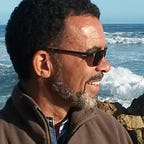Will Africa’s oceans become ‘sick’ due to climate change?
The migration of species towards the poles from the equator is well documented in temperate zones, as they ‘tropicalize’ — their native species move out, while warm-adapted more tropical species move in.
What about at the equator? Obviously, species will shift north and south … but who moves in?
In essence as equatorial regions warm there are no pre-existing analogues (apart from highly restricted and isolated regions such as the Arabian or Persian Gulf) from which pre-adapted species can move in from hotter zones. A decline in equatorial marine diversity is already being shown around the equator resulting from climate warming. This belt around the entire planet will become more depauperate as species move out, those that remain become more stressed and many die out, and nothing replaces them.
Dire, but that’s not all.
As ecosystems or communities lose species, particularly more complex adapted ones (such as higher predators, or symbiotic and mutualistic species), their depauperate state results in a more simplified ecosystem, analogous to a body or system becoming more sick. Opportunistic and generalist species, or those that feed on detritus may perform better. As temperatures rise cellular metabolism increases, positively reinforcing a cycle towards simplified food chains based on decaying organic matter and released nutrients.
But there is more …
Many equatorial coastlines — and certainly those of continental land masses or large islands — are facing increasing population pressure as well as rapidly rising incomes from development. Both of these multiply pressures on land and at sea, further simplifying marine environments through fishing and other extraction, as well as reinforcing bacterial and microbial loops through pollution from land runoff.
Equatorial coastlines are facing a novel and unknown predicament — of warming, declining diversity and food web simplification and ‘microbialization’. With few resident research institutions focusing on basic science and novel challenges, and global north institutions focused on biodiversity and development in the tropics and climatic changes in their temperate ecosystems, this phenomenon has gone un-noticed. One prescient article in 2005 queried the fate of US coral reefs on a ‘slippery slope to slime’[1], though at the time not even considering climatic migration as a primary component of this phenomenon.
Africa’s sits at ground zero of this problem …
Africa’s oceans are particularly vulnerable. It is the only continent straddling the equator more or less evenly, with wide equatorial marine belts on the Atlantic and Indian Ocean/Red Sea coasts. These same countries are pivoting to the ‘blue economy’ as a solution to economic growth needed to employ and feed populations set to double in 30 years.
The vulnerability of coastal fisheries in Africa to climate change is already high — from both biological vulnerability of the stocks and socio-economic vulnerability of the people. But these calculations don’t fully take into account this potential of Africa’s tropical seas becoming increasingly ‘sick’ with combined climate and human impacts.
So — one more reason we need the major greenhouse gas emitters to take full responsibility for their historical and potential future emissions, and assure climate warming is capped to 1.5 C, while African and all economies undergo the challenging but fully worthwhile effort to transform to sustainable, circular models.
[1] Science 307: 1725–1726. doi: 10.1126/science.1104258
